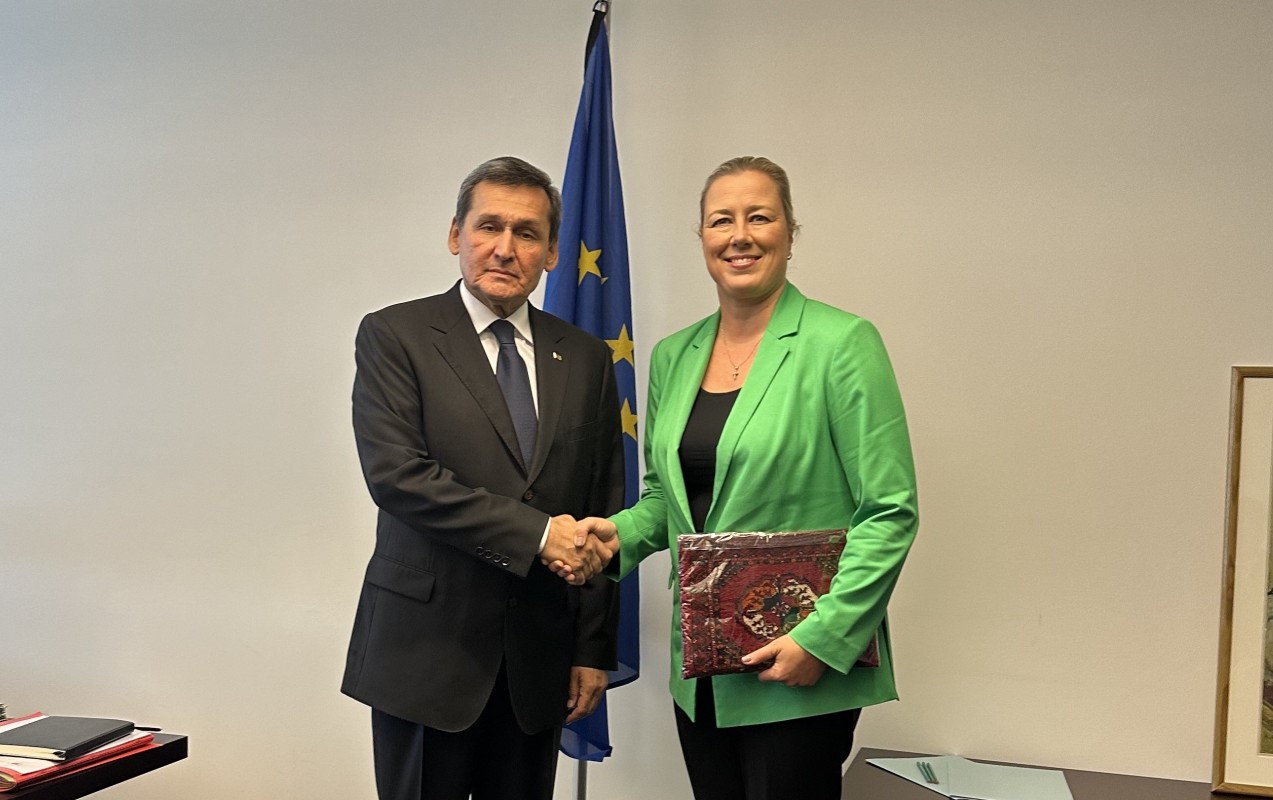Turkmenistan’s Foreign Minister, Rashit Meredow, and European Commissioner for International Partnerships, Jutta Urpilainen, held discussions aimed at enhancing energy cooperation. These talks took place within the framework of the ministerial meeting between Central Asia and the EU, which occurred in Luxembourg on October 23.
The focal point of their meeting revolved around the energy sector, specifically regarding hydrogen energy, methane emission reduction, and the conversion of natural gas. To illustrate the existing collaboration in this domain, they mentioned joint projects with GIZ in hydrogen and methane research, referring to Deutsche Gesellschaft für Internationale Zusammenarbeit (GIZ) GmbH, a German federal enterprise that operates worldwide.
Both Meredow and Urpilainen underscored the necessity of a systematic approach to energy projects, emphasizing the development of a shared Action Plan to enhance cooperation in this sector.
Meredow also provided valuable insights into Turkmenistan’s roadmap for 2023-2024, designed to strengthen international cooperation and explore potential participation in the Global Methane Commitment. Additionally, Urpilainen disclosed the EU’s ongoing considerations regarding the possibility of entering into an agreement with GIZ, aimed at advancing green energy initiatives in the region.
In light of the regional context and ongoing work to coordinate activities under the Team Europe project, both officials discussed prospects for collaboration in the fields of digital communications and water management. They acknowledged the relevance of these areas for the region and highlighted the effectiveness of the Team Europe program in digital integration. Urpilainen expressed the EU's keen interest in intensifying cooperation with Turkmenistan in these evolving sectors.
One of the key items on their agenda was the consideration of regional initiatives under the Team Europe program, emphasizing the importance of fostering collaboration in the energy and transport sectors. Within this context, they also addressed Turkmenistan’s progress toward joining the World Trade Organization (WTO), with Meredow expressing sincere gratitude for the EU’s support in this endeavor. Urpilainen reaffirmed the EU’s commitment to assist Turkmenistan in its pursuit of WTO membership.
Earlier, Turkmenistan’s President Serdar Berdimuhamedow said that “Turkmenistan intends to become a member of the World Trade Organization, currently holding the status of an active observer in the organization. We anticipate significant development in our foreign trade system and logistical links.”
The president has laid out key actions, such as negotiating trade agreements, improving the insurance market, strengthening international standardization ties, collaborating with global and regional commodity exchanges, integrating domestic producers into the global trade network, and creating a wholesale trade and logistics hub to boost Turkmen exports worldwide.
On October 9, President Berdimuhamedow met with the visiting OSCE Chairman-in-Office, North Macedonian Foreign Minister Bujar Osmani, to deliberate on ensuring the secure and dependable transportation of energy resources to global markets. Their discussions encompassed creating a conducive environment for sustainable economic growth, enhancing transport capabilities, environmental protection, and the rational utilization of water resources.
In late September, Turkmenistan’s national leader and speaker of the country’s highest representative body, former President Gurbanguly Berdimuhamedow, called on German businesses to take part in major energy, chemical, transport and agricultural projects in his country. Berdimuhamedow, while visiting Berlin, said that “in the energy sector, we are ready to discuss the supply of machinery and equipment from German manufacturers for Turkmenistan’s oil and gas sector and to study the prospects for introducing German technologies for using solar panels in Turkmenistan.”
He further added that Turkmenistan would like to study the German expertise in hydrogen production in order “to create high-tech production facilities in the country.”
During his visit to Berlin, Berdimuhamedow also told German Chancellor Olaf Scholz about the significance of the TransCaspian gas pipeline. “Our country is committed to this project and intends to resume dialogue on this issue with relevant European agencies,” the Turkmen speaker added.
Turkmen Deputy Prime Minister Shahym Abdrahmanov affirmed in November 2022 that his country remains committed to a TransCaspian pipeline project, which seeks to transport Turkmen gas to Europe, bypassing Russia.
Under certain proposals, the pipeline project envisions the annual supply of up to 30 billion cubic meters of Turkmen gas through Azerbaijan, Georgia, and Türkiye to the European market, spanning at least 30 years.
Turkmenistan is among the world’s most energy-rich nations, boasting 600 million barrels of confirmed oil reserves and 19.5 trillion cubic meters of proven natural gas reserves. In terms of proven gas reserves, it ranks fourth globally, following Russia, Iran, and Qatar.
Presently, the European Union is keen on expanding collaboration with oil and gas-producing countries, particularly Azerbaijan, Kazakhstan, and Turkmenistan, to bolster the supply of energy resources to the EU.







 President Ilham Aliyev shed light on the evolving contours of the peace process with Armenia during an international conference in Baku this week. ...
President Ilham Aliyev shed light on the evolving contours of the peace process with Armenia during an international conference in Baku this week. ...
 Azerbaijan and Armenia started the process of demarcation of their border on Tuesday, with the installation of the first border markers based on ge...
Azerbaijan and Armenia started the process of demarcation of their border on Tuesday, with the installation of the first border markers based on ge...
 Iran and Pakistan have signed eight cooperation documents in various fields, and agreed to strengthen ties to fight terrorism in the region.
Iran and Pakistan have signed eight cooperation documents in various fields, and agreed to strengthen ties to fight terrorism in the region.
 Iranian President Ebrahim Raisi expressed Tehran’s readiness to participate in significant development projects in Sri Lanka during the inauguratio...
Iranian President Ebrahim Raisi expressed Tehran’s readiness to participate in significant development projects in Sri Lanka during the inauguratio...
 As the conflict between Ukraine and Russia escalates, the strategic importance of Kharkiv, Ukraine's second-largest city, has come sharply into focus.
As the conflict between Ukraine and Russia escalates, the strategic importance of Kharkiv, Ukraine's second-largest city, has come sharply into focus.



